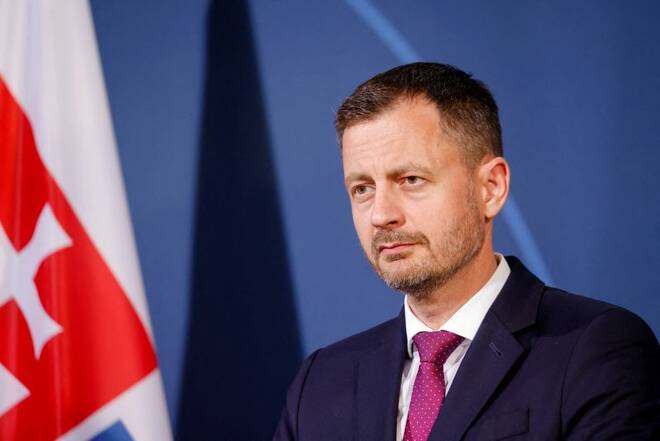Advertisement
Advertisement
Slovakia may stop power exports to EU without more help on energy costs
By:
(Reuters) - Slovakia could halt electricity supplies to other European Union countries if it doesn't get more help to cope with soaring energy costs, its prime minister warned on Friday, saying measures agreed by the bloc so far did not go far enough.
By Jan Lopatka
(Reuters) -Slovakia could halt electricity supplies to other European Union countries if it doesn’t get more help to cope with soaring energy costs, its prime minister warned on Friday, saying measures agreed by the bloc so far were not sufficient.
EU energy ministers agreed on Friday a package including a levy on fossil fuel companies’ surplus profits for this year or next, another levy on excess revenues low-cost power producers make from soaring electricity costs, and a mandatory 5% cut in electricity use during peak price periods.
But Slovak Prime Minister Eduard Heger said his country would only collect about 115 million euros out of the EU’s estimated 140 billion euros from the new levies, a fraction of the 1.5 billion euros that would be proportional to its population of 5.5 million.
Heger complained that there was no agreement on EU-wide sharing of the revenue from the levies, although there was a provision for voluntarily doing this on a bilateral basis.
This is a problem for Slovakia, he said, as its main producer has pre-sold energy for the next year at prices much lower than current ones, while Slovak distributors and customers must now buy electricity at multiple times that price.
Although Slovakia is a slight net importer of electricity, Heger noted that foreign entities had purchased future delivery contracts from the country’s dominant nuclear power and hydro utility Slovenske Elektrarne – partially owned by Enel and Czech group EPH – at a fraction of current prices.
Slovakia will not raise enough revenue from the approved package, he said.
“We clearly said that if we want a solution that will be effective for the entire EU, it must be taxation of disproportionate profits on a pan-European level, which will then be redistributed to individual member countries according to the level of consumption,” Heger said.
A levy needs to be applied for electricity traders as well as producers, he said, a provision that is in the agreed EU package on Slovakia’s proposal but only as a voluntary option.
“If you do not help us financially, we do not want to allow (an economic) collapse, therefore we have a Plan B that electricity made in Slovakia will not go to countries that have bought it, but we will give it to our citizens, our companies.”
Under that plan, holders of the electricity purchase contracts would only be compensated to the tune of their original costs, he said.
As an alternative to “solidarity” redirection of the revenue from the energy sector levies elsewhere, the EU could free up unused funding from other European programmes for Slovakia to prevent it from taking unilateral action, Heger said.
(Reporting by Jan Lopatka, Robert Muller and Jason Hovet; Editing by Jason Neely, Mark Potter and Paul Simao)
About the Author
Reuterscontributor
Reuters, the news and media division of Thomson Reuters, is the world’s largest international multimedia news provider reaching more than one billion people every day. Reuters provides trusted business, financial, national, and international news to professionals via Thomson Reuters desktops, the world's media organizations, and directly to consumers at Reuters.com and via Reuters TV. Learn more about Thomson Reuters products:
Did you find this article useful?
Latest news and analysis
Advertisement
